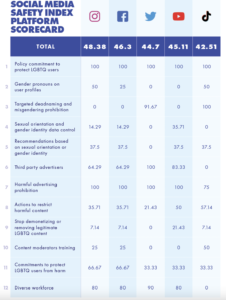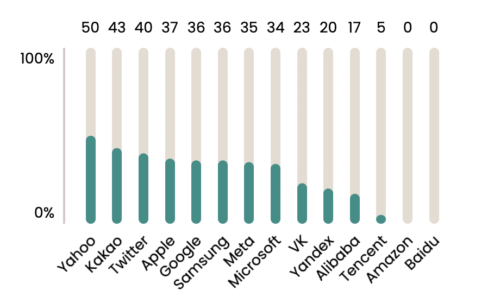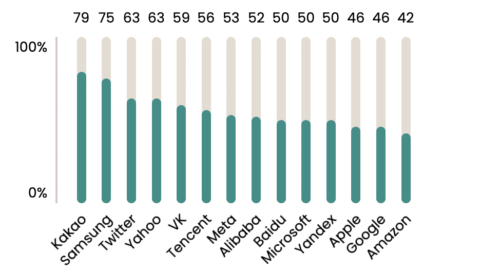
Since our last Radar, policymakers and advocates on both sides of the Atlantic have achieved key milestones in the effort to bring accountability to Big Tech. In July, the European Parliament adopted the Digital Services Act (DSA) and the Digital Markets Act (DMA), two landmark pieces of legislation that together comprise “a first comprehensive rulebook for the online platforms that we all depend on in our daily lives.” The European Commission is standing up a new enforcement apparatus, DG CONNECT, ahead of both laws going into effect in January 2023. Our friends at Access Now, Amnesty International, Article 19, EFF, and Human Rights Watch all have excellent analyses.
On the U.S. side, progress recently encountered some big obstacles. The House of Representatives passed two antitrust bills targeting the Big Tech sector, but the package is unlikely to face a vote in the Senate before the November midterms. Supporters of the bills have pointed out that the daughters of Senate Majority Leader Chuck Schumer (D-NY), who controls the upper chamber’s legislative calendar, are lobbyists for Meta and for Amazon. The American Data Privacy and Protection Act (ADPPA) is similarly stalled in the House as California Democrats side with their state’s governor and the California Privacy Protection Agency in opposing the ADPPA, which they accuse of preempting California’s state privacy laws.
Supporters of the federal bill, including RDR, argue that the ADPPA is substantively stronger than the California laws and would protect all Americans, rather than only residents of California. Speaker Nancy Pelosi (D-CA) has indicated that she would only bring the bill to a floor vote if the Energy and Commerce Committee could come to an agreement with the California delegation. But, as of now, it is unlikely that either the antitrust package or the ADPPA will be signed into law this year. The prospect of Big Tech accountability legislation passing in the near future now hinges on the composition of the 118th Congress.
With the ADPPA stalled, attention has turned to the Federal Trade Commission (FTC), which is moving ahead with plans to do privacy via rulemaking, regardless of what happens on Capitol Hill. The agency is currently soliciting comments on commercial surveillance practices and data security. The RDR team is hard at work on our submission, and we are excited to help the FTC build the evidence it needs to support a future rulemaking process.
As for President Joe Biden, the White House has released a set of Principles for Enhancing Competition and Tech Platform Accountability focused on competition, privacy, child protection, transparency, and the discriminatory impact of algorithmic decision-making. We’re glad to see the White House engaging on the issue, but we’re concerned that the principles include a reiteration of the president’s longstanding calls for “fundamental reform” to Section 230, a cornerstone of free expression online.
As ESG Has Evolved, So Has Our Investor Guidance!
Investor advocacy and shareholder action on human rights topics have reached unprecedented levels this year. Five of the largest global tech companies—Alphabet (Google), Amazon, Apple, Meta, and Twitter—all faced a record number of shareholder resolutions. Meanwhile, RDR’s involvement in shareholder resolutions has also evolved in the past two years: from providing briefings that informed resolutions to directly shaping them alongside activist investors. To make our work more accessible and visible, we have put together an Investor Guidance page that reflects our growing impact.
A resolution brought forth at Meta by Mercy Investment Services in May, with RDR’s support, called for a human rights impact assessment of the company’s targeted ad systems and got a clear majority of shareholders behind it. The proposal received the strongest support of any in Meta history and would easily have passed but for Mark Zuckerberg’s unequal voting power. In May, more than 20 organizations signed onto RDR’s letter calling on the SEC to curb these kinds of unequal ownership structures.
Check out our table of recent, relevant shareholder resolutions –>
We’re Helping Bring RDR’s Standards Across the Globe
 Did you know we work with organizations all over the world to adapt our methods and standards to highlight how a lack of platform accountability affects local issues and environments? This year alone, we’ve collaborated with 10 organizations in different corners of the world to produce original platform accountability research and scorecards.
Did you know we work with organizations all over the world to adapt our methods and standards to highlight how a lack of platform accountability affects local issues and environments? This year alone, we’ve collaborated with 10 organizations in different corners of the world to produce original platform accountability research and scorecards.
For example, RDR recently partnered with two African-based human rights organizations, Paradigm Initiative and the Internet Freedom Project Lesotho, to support breakthrough new research about the human rights risks posed by local telecommunications companies in Central and Eastern Africa, who often prioritize
government compliance over user privacy.

Meanwhile, in the U.S., GLAAD published its second Social Media Safety Index in July. This included a new scorecard that RDR helped produce. In August, RDR spoke with the report’s co-author, Jenni Olson, about GLAAD’s new research, which comes at a time of increasing online hate and violence toward LGTBQ people.
Read our interview with Jenni to learn more about why GLAAD chose to use RDR’s methodology to create a safer online environment, and the impact they’ve seen so far.→
If you’re a researcher or advocate interested in learning more about our methodology, we’d love to talk to you! Write to us at partnerships@rankingdigitalrights.org.
Scorecard Scoop: Amazon’s Next Monopoly Move Is Your Health!

The Great Economic Super Bowl by Matt Wuerker. Via CC 4.0
Although Amazon Health, Amazon’s virtual care company, may now be dead, Amazon’s health-care ambitions live on—with the company’s sights now set instead on acquisitions. In July, it purchased One Medical for $3.9 billion. In August, Amazon lost out to CVS in its bid to acquire health-care platform Signify Health. The decision to buy an Amazon Health competitor rather than competing with it directly has piqued the interest of the FTC, which is investigating Amazon’s recent acquisitions.
When Amazon acquires new companies, it acquires all their data. This is especially problematic with a primary care company like One Medical, which will provide Amazon with direct access to troves of patient data. The Dobbs decision has also further amplified concerns about who has access to our medical information.
So, why shouldn’t users trust Amazon with sensitive information like their health history?
Well, the 2022 Big Tech Scorecard showed that Amazon is one of the two worst scoring companies (scoring far worse than any other U.S. company) on retention of user information, disclosing absolutely nothing about how long they hold onto our data. The longer Amazon holds onto your data, the higher the chance of this data being compromised during a breach. And Amazon makes no commitments in the event that such a breach does take place.
Company Disclosure on Retention of User Information

Amazon is also the worst-scoring digital platform we rank when it comes to disclosures about sharing user data. It does not disclose the names of any of the third parties with which it shares information.
Company Disclosure on Sharing of User Information

From doorbell camera footage to home layouts, thanks to newly acquired Rumba vacuum cleaners, to shopping habits, Amazon is becoming an ever greater first-party data Goliath. Recklessly blending this data, and with zero transparency about what it’s doing with it, is a threat to human rights. We must call on Amazon to show exactly how it plans to strengthen its privacy protections before it moves ahead with yet another acquisition, as it surely will.
RDR Media Hits
Gizmodo: Policy Director Nathalie Maréchal was quoted in an article from Gizmodo about the American Data Privacy and Protection Act: “This is a law that can pass. It is outlandish that we don’t have a federal baseline privacy bill, and this is vastly better than the status quo.”
Forbes: A look at RDR’s work with GLAAD to produce the LGBTQ rights organization’s Platform Scorecard. “In its report, GLAAD explained that its own scorecard started with the Ranking Digital Rights Big Tech Scorecard, the annual evaluation of the world’s most powerful digital platforms,” according to the article.
Support Ranking Digital Rights!
If you’re reading this, you probably know all too well how tech companies wield unprecedented power in the digital age. RDR helps hold them accountable for their obligations to protect and respect their users’ rights.
As a nonprofit initiative that receives no corporate funding, we need your support. Do your part to help keep tech power in check and make a donation. Thank you!





